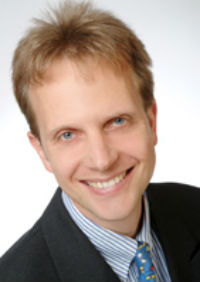Solid State Physics
Lecturers: Volkmar Zielasek
The lecture will cover basic topics of solid state physics:
1) Electronic structure (band structure, Bloch waves, metals and insulators, photoelectron spectroscopy, optical absorption)
2) Lattice vibrations (basic modes, phonons, dispersion, specific heat, anharmonic effects - thermal expansion, thermal conductivity)
3) Metals and Semiconductors (electrical conductance, thermodynamics of the electronic system, intrinsic semiconductors, dopants, p-n junction, diode and photovoltaic cell)
4) Magnetism (dia-, para- and ferromagnetism, susceptibility, hysteresis, domain walls)
After attending the module, the students will have an overview over concepts in solid state physics. They will be able to apply these concepts to describe structural, electronic and thermal properties of metals, semiconductors and insulators. The participants will
- know and properly use basic terminology of solid state physics and understand its meaning
- interpret depictions of electronic band structure and vibrational spectra of crystalline solids
- know and differentiate between basic experimental methods to analyze the electronic and vibrational structure of solids
- predict electrical, magnetic and thermal properties of metals, insulators and semiconductors based on basic structural data
The course ends with a written module examination. The contents of all three courses will be examined.
Klausur
Hoffmann; Solids and Surfaces: A Chemist`s View of Bonding in Extended Structures, Wiley VCH 1988
Ibach/Lüth; Solid-State Physics: An Introduction to Principles of Materials Science, Springer 2008
1st SWS: 1. Electronic structure of crystalline solids I (Preface: Electronic structure of atoms and molecules; orbitals and bands in one dimension)
2nd SWS: Electronic structure of crystalline solids II (Extension to three dimensions, Brillouin zone)
3rd SWS: 3. Electronic structure of crystalline solids III (Semiclassical model of electron properties in the band structure; metals, semiconductors and insulators)
4th SWS: Photoelectron spectroscopy
5th SWS: Optical absorption in the band structure
6th SWS: Vibrations of a crystalline solid I (Harmonic approximation, basic modes)
7th SWS: Vibrations of a crystalline solid II (Optical modes, phonons, specific heat)
8th SWS: Phonon spectroscopy (Raman scattering, inelastic neutron scattering)
9th SWS: Anharmonic effects (thermal expansion, thermal conductivity)
10th SWS: Statistics of quantum particles (Overview)
11th SWS: Electrical transport in metals and semiconductors
12th SWS: Semiconductor Devices (pn-junction, diodes, photovoltaic cell)
13th SWS: Magnetism I (Magnetic moment, susceptibilty, diamagentism)
14th SWS: Magnetism II (Paramagentism, Ferromagnetism)
Basic Data
05-MCM-CH-3
Study Program
Master Materials Chemistry and Mineralogy
Module Name
Chemistry
Course Type
Lecture, Exercise (L+E)
First Year of Study
3 CP
2 SWS
Winter Term
Course Language
English
Contact Person

Fachbereich 02: Biologie/Chemie
Dr. Volkmar Zielasek
UFT - FB2 1100R
Phone: +49 421 218 - 63180
zielasek uni-bremen.de
uni-bremen.de
Fachbereich 02: Biologie/Chemie
Dr. Volkmar Zielasek
UFT - FB2 1100R
Phone: +49 421 218 - 63180
zielasek uni-bremen.de
uni-bremen.deLecturer

Fachbereich 02: Biologie/Chemie
Dr. Volkmar Zielasek
UFT - FB2 1100R
Phone: +49 421 218 - 63180
zielasek uni-bremen.de
uni-bremen.de
Fachbereich 02: Biologie/Chemie
Dr. Volkmar Zielasek
UFT - FB2 1100R
Phone: +49 421 218 - 63180
zielasek uni-bremen.de
uni-bremen.de
